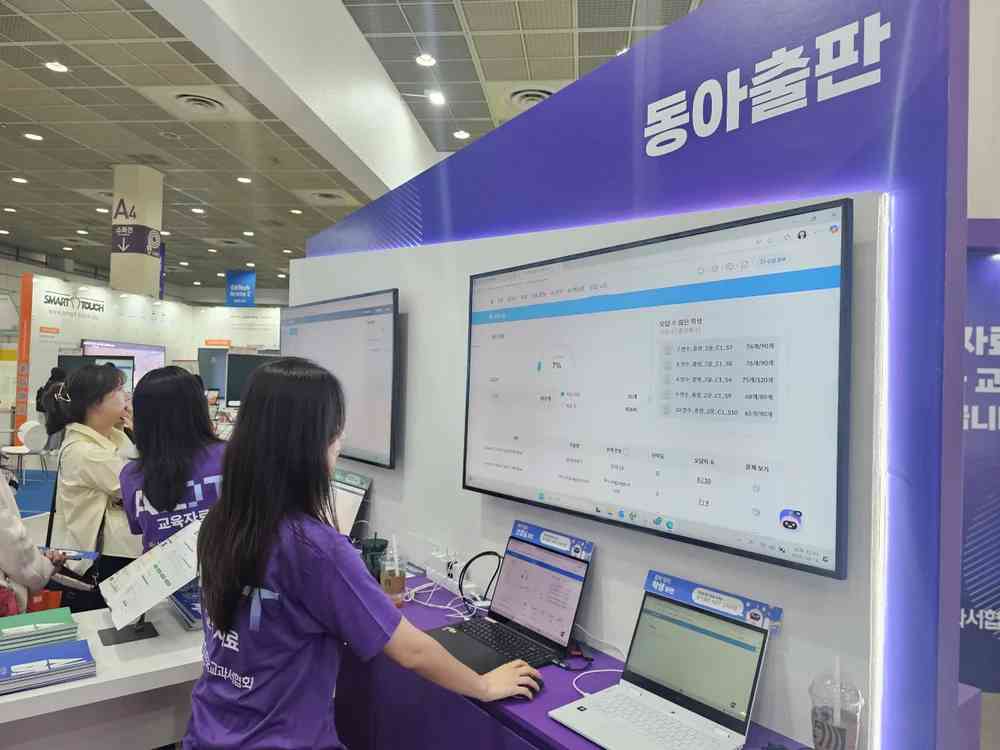
This article was originally published in Rest of World, which covers technology’s impact outside the West.
Ko Ho-dam, a high school junior on South Korea’s Jeju Island, was at first curious to hear that the government planned to roll out artificial intelligence-powered textbooks. The programme would provide personalised learning for students, help prevent dropouts and reduce the workload of teachers, authorities promised.
The programme – a flagship initiative of former President Yoon Suk Yeol – took shape over the last year and a half, with about a dozen publishers approved to develop the digital textbooks. When the textbooks were launched at the start of the school year in March for math, English, and computer science, Ko was disappointed, he told Rest of World.
“All our classes were delayed because of technical problems with the textbooks,” Ko said. “I also didn’t know how to use them well. Working individually on my laptop, I found it hard to stay focused and keep on track. The textbooks didn’t provide lessons tailored to my level.”
Across the country, students like Ko, as well as teachers and parents, complained that the books had factual inaccuracies, posed data privacy risks, increased screen time for children, and resulted in a heavier workload for teachers and students. After just one semester – four months – the AI textbooks were stripped of their official status as textbooks, and classified as “supplementary material”, meaning their adoption is left to each school’s discretion.
South Korea’s experience shows that embedding AI in education is complex, and requires careful handling, Lee Bohm, a doctoral candidate at the Centre of Development Studies at the University of Cambridge, told Rest of World.
“AI should first be piloted in homework or practice before being carefully introduced in class,” said Lee, who was previously a policy adviser to the Seoul education office. “The focus should be on how to integrate it into the school curriculum, as that’s the only way AI-based education can be truly effective. In South Korea, attempts to apply it in class were pushed too far.”
Governments around the world are betting that AI will revolutionise education. Big tech firms including Meta, Google, and OpenAI are aggressively promoting initiatives in schools worldwide. Some countries have embraced AI tools to solve teacher shortages and bridge the gap between urban and rural students. In others, AI chatbots and other tools have worsened student performance and increased the workload for teachers.
South Korea is an early adopter of technology, with robot chefs and robot carers becoming an increasingly common sight. Authorities have long backed edtech, training teachers in the use of AI, and deploying digital tutors to support teachers and students.
The government spent more than 1.2 trillion won ($850 million) on the AI textbook programme, including on equipment and teacher training. The publishing companies invested around 800 billion won ($567 million) to develop the textbooks.
There were signs of unease early on. In November, the Korean Teachers and Education Workers Union, and civic groups such as Political Mamas, which campaigns for the welfare of women and children, sued the then-minister of education for abuse of authority, saying the programme was “problematic” because it made the use of AI textbooks mandatory. The groups also said the rollout overlooked potential risks to children, lacked data protection measures, and ignored the inputs of teachers and parents.
“The textbooks worsen learning effectiveness and negatively affect students,” Jang Ha-na, a member of Political Mamas, told Rest of World. “Once digital devices like tablets become central in classrooms, screen exposure increases, leading to weaker literacy and communication skills.”

In response to the pushback, the government in January shifted from mandatory adoption to a one-year voluntary trial. Yoon, who had championed the AI textbook project, was impeached by the parliament for his attempt to impose martial law in December, and officially removed from presidency in April.
Despite the political turmoil, the AI textbooks were introduced as planned in March. Lee Jae Myung, who had promised in his election campaign to rescind the AI textbook policy, was elected president. Lawmakers revoked the status of the AI textbooks in August, leaving it up to schools to use them.
The adoption rate for the AI textbooks dropped from 37% in the first semester ending in July to 19% in the current semester that began in September. Only 2,095 schools are signed on now, about half the number earlier in the year, according to data compiled by lawmaker Kang Kyung-sook, who had opposed the programme’s rollout.
“Traditional print textbooks take 18 months to develop, nine months for review, and six months for preparation. But the AI textbooks took only 12, three, and three months, respectively. Why was it rushed?” Kang asked the then-minister of education in parliament in January. “Since they target children, they require careful verification and careful procedures.”
The companies that developed the textbooks say they adhered to the country’s security protocols, and that no personal data of the students was stored. Students are already “hooked” to devices, and the textbooks themselves did not cause screen addiction, Kim Jong-hee, chief digital officer of Dong-A Publishing, one of the textbook developers, told Rest of World.
“Using digital devices they are familiar with keeps them more focused, awake, and more willing to participate,” Kim said. “The textbooks provide more personalised support for students struggling with lessons. They can also help the growing number of students from multicultural families who aren’t confident in Korean, and make learning more accessible for students with disabilities and those in rural and underserved areas.”
Expensive private tuition, or hagwon, is the norm in the country. But for AI textbooks to reduce inequality and for students to benefit from them, more hands-on use is needed, Kim said. This is now more difficult, with fewer schools using them. “One key reason [for the programme’s setbacks] is that the issue has become overly politicised,” he said.
The Textbook Development Committee, which represents the companies, plans to file a constitutional complaint and a lawsuit for financial damages against the government, Hwang Geun-sik, chair of the committee, told Rest of World.
“The companies that trusted the government and invested saw the market suddenly disappear,” Hwang said. “Our business is shrinking, and staff cuts have become unavoidable.”
In classrooms, teachers and students are still divided over the AI textbooks.
“Monitoring students’ learning progress with the books in class was challenging,” Lee Hyun-joon, a high school math teacher in Pyeongtaek city, told Rest of World. “The overall quality was poor, and it was clear it had been hastily put together.”
For Kim Cha-myung, an elementary school teacher in Gwangmyeong city near Seoul, the textbooks were convenient, helping save time and support struggling students. Students appreciated the digital features such as earning hearts as prizes for good performance, customising their avatars, and solving problems in a game-like format, he told Rest of World.
“The programme failed because everything was rushed; it should have been rolled out gradually after testing its effectiveness,” he said.
The government’s flip-flop has impacted students and teachers beyond just learning, said Kim.
“We no longer trust the government, which I see as the biggest problem.”
Junhyup Kwon is a reporter based in Seoul, South Korea.
This article was originally published in Rest of World, which covers technology’s impact outside the West.
📰 Crime Today News is proudly sponsored by DRYFRUIT & CO – A Brand by eFabby Global LLC
Design & Developed by Yes Mom Hosting






